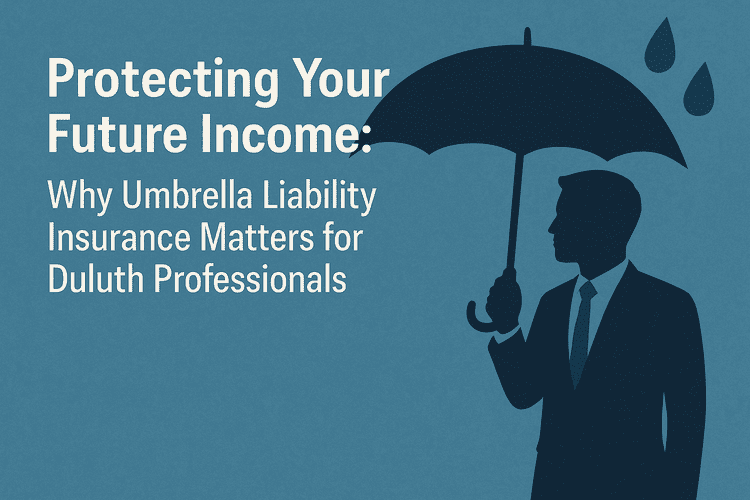
Could a single lawsuit threaten everything you’ve worked for?
Have you considered how your future income — not just your current assets — could be at risk?
For high-earning professionals in Duluth, Georgia, personal liability exposure has evolved far beyond what traditional insurance policies were designed to handle. If your career success has placed you in a high-net-worth or high-income category, you may already be a target — whether you realize it or not.
In this article, we’ll explore why umbrella liability insurance is no longer optional for professionals in Duluth. You’ll learn what it covers, what it doesn’t, and how it protects your income stream — not just your assets — in today’s complex financial and legal landscape.
Why Duluth’s Professionals Are Uniquely Exposed
With a median household income nearly 30% higher than the national average and a highly educated population, Duluth professionals enjoy elevated earning power — but also face amplified financial risk. High-income earners are statistically more likely to be named in liability lawsuits simply due to their perceived ability to pay.
Add in the city's demographic diversity, public-facing careers, and tech-savvy environment, and you’ve got a perfect storm of risk exposures that can lead to claims for defamation, advisory missteps, or even injuries at a home-hosted client event.
What Umbrella Insurance Actually Covers
Umbrella liability insurance is often misunderstood. It's not a standalone policy that replaces homeowners or auto coverage — it's a financial safety net that kicks in after those coverages reach their limits.
Here’s what it typically covers:
- Injuries or property damage claims exceeding your primary policy
- Legal defense costs in personal liability cases
- Libel, slander, or defamation claims
- Liability situations not covered by your base policies, like hosting events or informal professional interactions
For example, if you’re involved in a car accident with $500,000 in damages but your auto policy only covers $300,000, umbrella insurance could cover the remaining $200,000 — protecting your savings and future income from garnishment.
Why Future Income Needs Protection Too
You’re likely already protecting your home, car, and savings — but what about the $5–10 million you’ll earn over the next two decades?
In Georgia, wage garnishment and court judgments can seize future income in the event of large liability claims. For Duluth professionals earning above $90,000 per year, that future income is a significant — and vulnerable — asset.
At a typical cost of just $200–$300 per year for $1 million in coverage, umbrella insurance represents one of the most cost-effective financial defenses available.
The Georgia Gap: No Mandatory Coverage, High Potential Risk
Unlike some states, Georgia doesn’t require professional liability insurance for most careers. That flexibility sounds good — until it creates dangerous coverage gaps. Real estate agents, attorneys, consultants, and even healthcare professionals may be unknowingly underinsured.
In Duluth, where many residents work in high-liability fields like tech, finance, and real estate, optional coverage often leads to accidental underprotection. Umbrella insurance can’t fill all those gaps, but it plays a critical role in backstopping your broader liability strategy.
What Umbrella Insurance Doesn’t Cover — And Why It Still Matters
It’s important to understand the limits of this policy. Personal umbrella insurance generally won’t cover:
- Errors and omissions from your professional services
- Business liability
- Contract disputes or employment-related claims
But it does protect you in the gray zones that most professionals miss — like volunteering on a nonprofit board or giving casual advice at a networking event that someone relies on to their detriment.
Coordinating your professional liability policy with a personal (or commercial) umbrella policy ensures that no matter where a claim arises, you’re covered.
The ROI on Peace of Mind
Let’s do the math.
Say you earn $150,000 per year. Over the next 25 years, that’s over $3.75 million in income. The annual cost of umbrella insurance to protect that? Less than $1 per day.
That’s not a luxury — that’s strategic planning.
Umbrella insurance doesn’t just protect your bank account. It safeguards your ability to keep earning, maintain your lifestyle, and preserve your professional reputation after a liability crisis.
How Much Coverage Do You Actually Need?
A good rule of thumb for coverage is:
2–3x your net worth + your annual income
So if your net worth is $500,000 and you make $150,000/year, you should consider a policy between $1.2 and $2 million in coverage. Many professionals opt for even higher limits once they understand the risks.
Be sure your homeowners and auto policies meet the minimum limits required by the umbrella provider — usually $250,000–$300,000 — or your umbrella coverage may not activate when you need it most.
What's Next: Securing Your Future, Not Just Your Present
You now know that umbrella liability insurance is about far more than adding a layer to your home or auto coverage. It’s about protecting the career and lifestyle you’ve worked hard to build — and the future income you haven’t even earned yet.
If you’ve been relying solely on standard insurance or haven’t revisited your liability exposure in years, now is the time.
We’ve worked with professionals across Duluth and Georgia to build custom coverage plans that reflect their real-life risks, not just hypothetical ones.
Your career is worth protecting — not just today, but for decades to come.


